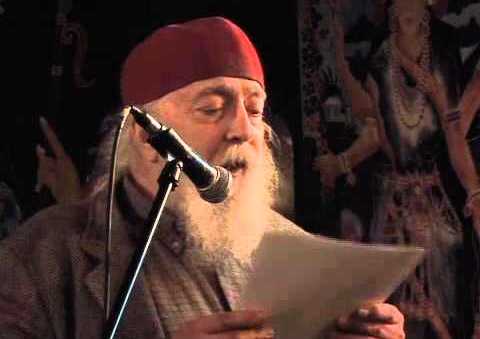 Peter Lamborn Wilson, celebrated "underground intellectual" and a pivotal figure in the revival of American anarchism over the past 40 years, died May 23 at his home in Saugerties, NY, reportedly from a heart attack. A controversial as well as inspirational figure, Wilson was the author of several cult classics, ranging from ecstatic rants to anti-authoritarian interpretations of history and what he called "drop-out culture."
Peter Lamborn Wilson, celebrated "underground intellectual" and a pivotal figure in the revival of American anarchism over the past 40 years, died May 23 at his home in Saugerties, NY, reportedly from a heart attack. A controversial as well as inspirational figure, Wilson was the author of several cult classics, ranging from ecstatic rants to anti-authoritarian interpretations of history and what he called "drop-out culture."
Although he had been in failing health for the past years, his death was not expected.
Moorish radical bohemia
Born in Baltimore in 1945, Wilson was radicalized in the early 1960s. While studying classical literature at New York's Columbia University, he fell in with an eclectic and semi-facetious invented spiritual sect called the Moorish Orthodox Church. This was a white beatnik offshoot of the Moorish Science Temple, a surviving predecessor to the Black Muslim movement, founded in 1916 by the Prophet Noble Drew Ali. The MOC was a small circle of white drop-outs alienated from white culture and identifying with Islamic and eastern mysticism, and especially the Sufi tradition. They were given a recognized franchise by a local Moorish Science chapter in Baltimore.
Steeped in bebop jazz, cannabis and Persian poetry, the MOC maintained a motorcycle club on Manhattan's Upper West Side. They also had interactions in this period with Timothy Leary's League for Spiritual Discovery, which was pioneering early experiments with LSD as an aid to meditation.
Journey to the East
in 1968, Wilson undertook his journey to the East. Initially flying to Lebanon, he would travel across the Islamic world, from Morocco to Indonesia, spending much time in Afghanistan, Pakistan and India, studying Sufism and meeting with spiritual masters.
Peter ultimately settled in Tehran, where he was involved in theater and translation work. For some time, he was the editor of Sophia Perennis, the journal of the Iranian Institute of Philosophy.
Anarchist icon
Wilson left Iran with the 1979 revolution, and returned to New York—just as the US was undergoing the Reagan "revolution," and big shift to the right. This further radicalized Peter, and he began to change his former quietist ethic for a more vocal and activist stance.
In the 1980s, he joined New York's Libertarian Book Club, founded in 1946 by mostly Jewish and Italian left-wing anarchist exiles from fascist Europe. Peter became a key figure in the LBC's resurgence in the '80s, the slightly moribund organization infused with a fresh generation informed by the punk subculture and ultra-left thinking such as Situationism. Peter delivered an annual "Chaos Day" lecture every December, which was the biggest draw of the year in the LBC's monthly Anarchist Forum series.
During this period, he settled in Manhattan's East Village, where he was for many years a neighborhood fixture.
In 1988, Peter started producing the Moorish Orthodox Radio Crusade on New York's listener-supported WBAI, a weekly anarchist variety show in the station's idiosyncratic late-night "free-form" tradition.
He also became a prolific writer. Among the works produced in this period were Scandal: Essays in Islamic Heresy and Sacred Drift: Essays on the Margins of Islam, which both discussed the anarchistic strains of heretical Sufism, and Pirate Utopias: Moorish Corsairs & European Renegadoes. He was also a contributor to the anthology Gone to Croatan: Origins of North American Dropout Culture—about "tri-racial isolate" communities in colonial America, made up of escaped Black slaves and white indentured servants who joined the Indians. In 1999, I co-edited with Peter Avant Gardening: Ecological Struggle in the City & the World, which focused on the commuity gardening movement on the Lower East Side, then under attack by the real-estate interests and Rudolph Giuliani administration. All these titles were published by Brooklyn's Autonomedia.
Hakim Bey
Peter became widely associated in the popular mind with the mysterious and reclusive author Hakim Bey, held by many to actually be Wilson's pseudonym. Hakim Bey's classic work was TAZ: The Temporary Autonomous Zone, in which he expounded his thoery of "ontological anarchism." More militant in tone was his Black Fez Manifesto, striking an anti-civilization note. With Abel Zug, Hakim Bey co-wrote Orgies of the Hemp Eaters, an exhaustively researched compendium of cannabis culture, with an emphasis on the herb's ritual use
Hakim Bey would attract several controversies. He was especially assailed by another iconic American anarchist: the Vermont-based theorist of Social Ecology, Murray Bookchin, who accused Bey of promoting an individualistic and self-indulgent "lifestyle anarchism."
Semi-retirement and legacy
Some 20 years ago, Peter retreated to New York's Hudson Valley, where he continued to write, research, produce art, and occassionally give lectures and readings.
I served as Wilson's understudy on the Moorish Orthodox Radio Crusade and eventually became primary producer of the show as Peter slowly turned it over to me in the 1990s. Another LBC comrade, Ann-Marie Hendrickson, was also brought in as co-producer. The MORC was cancelled by WBAI amid a political purge at the station in 2011, but can be said to have two successors—my podcast, CounterVortex, and Hendrickson's late-night program on BAI, A Mansion for the Rat.
Peter's legacy is discussed in the first episode of the short-lived YouTube version of the MORC.
Photo via Twitter







Recent comments
6 days 13 hours ago
4 weeks 6 days ago
5 weeks 5 days ago
15 weeks 5 days ago
19 weeks 5 days ago
20 weeks 5 days ago
20 weeks 6 days ago
41 weeks 6 days ago
46 weeks 14 hours ago
47 weeks 4 days ago